Why Knowing Where Body Composting Is Legal Matters for Funeral Directors
Where is body composting legal has become one of the most searched questions in the funeral industry as families increasingly seek environmentally friendly alternatives to traditional burial and cremation. Based on 2024 data, human composting (also called natural organic reduction or terramation) is currently legal in 12 U.S. states: Washington, Colorado, Oregon, Vermont, California, New York, Nevada, Arizona, Maryland, Delaware, Minnesota, and Maine.
Quick Answer - States Where Human Composting Is Legal:
- Washington (2019) - First state, fully operational
- Colorado (2021) - Fully operational
- Oregon (2021) - Fully operational
- Vermont (2022) - Legal, limited facilities
- California (2022) - Legal starting 2027
- New York (2022) - Legal, facilities developing
- Nevada (2023) - Recently legalized
- Arizona (2024) - Recently legalized
- Maryland (2024) - Recently legalized
- Delaware (2024) - Recently legalized
- Minnesota (2024) - Recently legalized
- Maine (2024) - Recently legalized
The growing demand reflects a significant shift in consumer preferences. According to the National Funeral Directors Association, 68% of Americans would consider green funeral options. This trend is creating new opportunities and challenges for funeral directors who need to understand the legal landscape and equipment requirements.
Important note: There's often a significant lag between legalization and operational facilities. Some states may be legal but not yet have licensed providers or proper infrastructure.
For families in non-legal states, cross-border transport to facilities in legal states remains an option, though it requires careful coordination with licensed funeral homes and proper documentation.
As American Mortuary Coolers with years of experience supplying specialized equipment to funeral homes across the country, I've seen how the question of where is body composting legal directly impacts facility planning and equipment needs. Understanding these legal requirements helps funeral directors make informed decisions about expanding their services and investing in the right infrastructure.
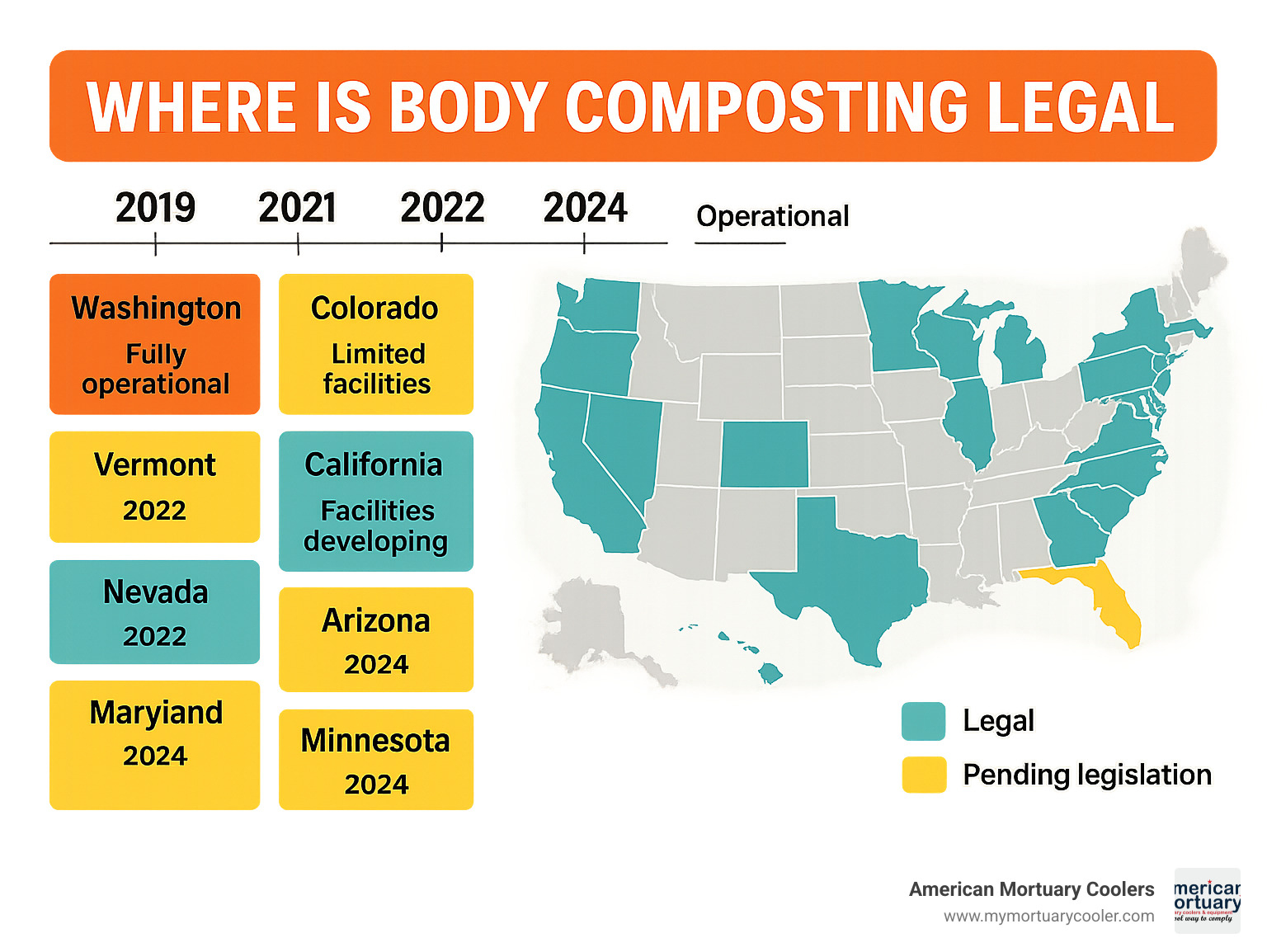
Simple guide to where is body composting legal terms:
Step 1: Learn the Key Terms Before You Search
When you're trying to figure out where is body composting legal, the first challenge isn't finding information—it's knowing what to search for. The funeral industry uses several different terms for the same process, and using the wrong one might leave you empty-handed.
Natural organic reduction is the official term you'll see in most state laws. It's the formal, legal name that legislators use when they're writing bills and regulations. But most families and funeral directors simply call it human composting—and that's perfectly fine for everyday conversation.
Some companies have created their own branded terms. Terramation is a trademarked name used by Return Home, while Recompose uses the term recomposition for their process. These are essentially the same thing, just with different company names attached.
Don't confuse human composting with other eco-friendly options. Green burial means putting an unembalmed body directly into the earth in a biodegradable casket or shroud. Alkaline hydrolysis (sometimes called water cremation or aquamation) uses heated water and chemicals to dissolve the body, leaving only bones behind.
These distinctions matter because state laws treat each method differently. When you're researching where is body composting legal, you might find that your state allows green burial but not human composting, or vice versa.
Your search will be much more effective if you use these specific terms: natural organic reduction, human composting, terramation, recomposition, and disposition laws. Also try searching for your state's specific bill numbers—every state uses different legislation names when they legalize the process.
Washington started it all with Senate Bill 5001, while Colorado used SB21-006. Knowing these bill numbers helps you find the actual legal text and understand exactly what's allowed in each state.
More info about Turning a Body Into Compost
Step 2: Where Is Body Composting Legal in 2024?
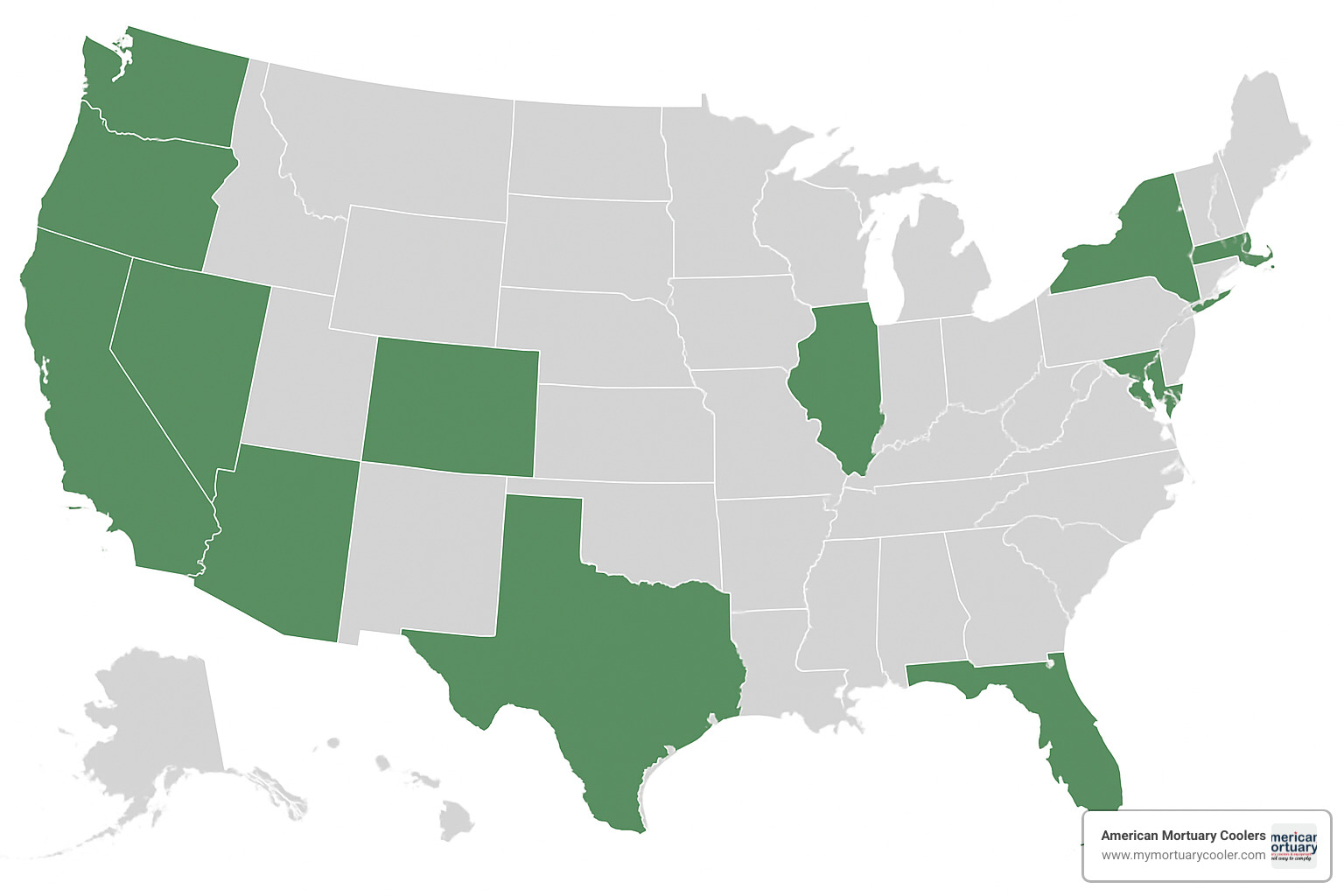
As of 2024, twelve U.S. states have enacted natural organic reduction legislation.
Legal & Operational
- Washington (2019)
- Colorado (2021)
- Oregon (2021)
Legal – Facilities Developing
- Vermont, New York (2022)
- Nevada (2023)
Recently Legalized – Rules in Draft
- Arizona, Maryland, Delaware, Minnesota, Maine (2024)
Legal but Delayed Start
- California – services begin in 2027
Passing a bill is only step one; states still need to draft regulations, license providers and create inspection protocols, so availability lags months—or years—behind legalization.
More info about 7 Quick and Easy Ways to Find States Allowing Body Composting
How to verify current status
- Check your state funeral board for licensed facilities.
- Read the actual bill text (e.g., Washington SB 5001, Colorado SB21-006).
- Call the state health department—phone staff often have the most up-to-date details.
International outlook
Outside the U.S., no country has formally legalized human composting. However, Canadian families can use Return Home in Seattle, which handles all cross-border paperwork and CFIA soil-import rules.
Step 3: Track Pending Bills & Advocacy Efforts
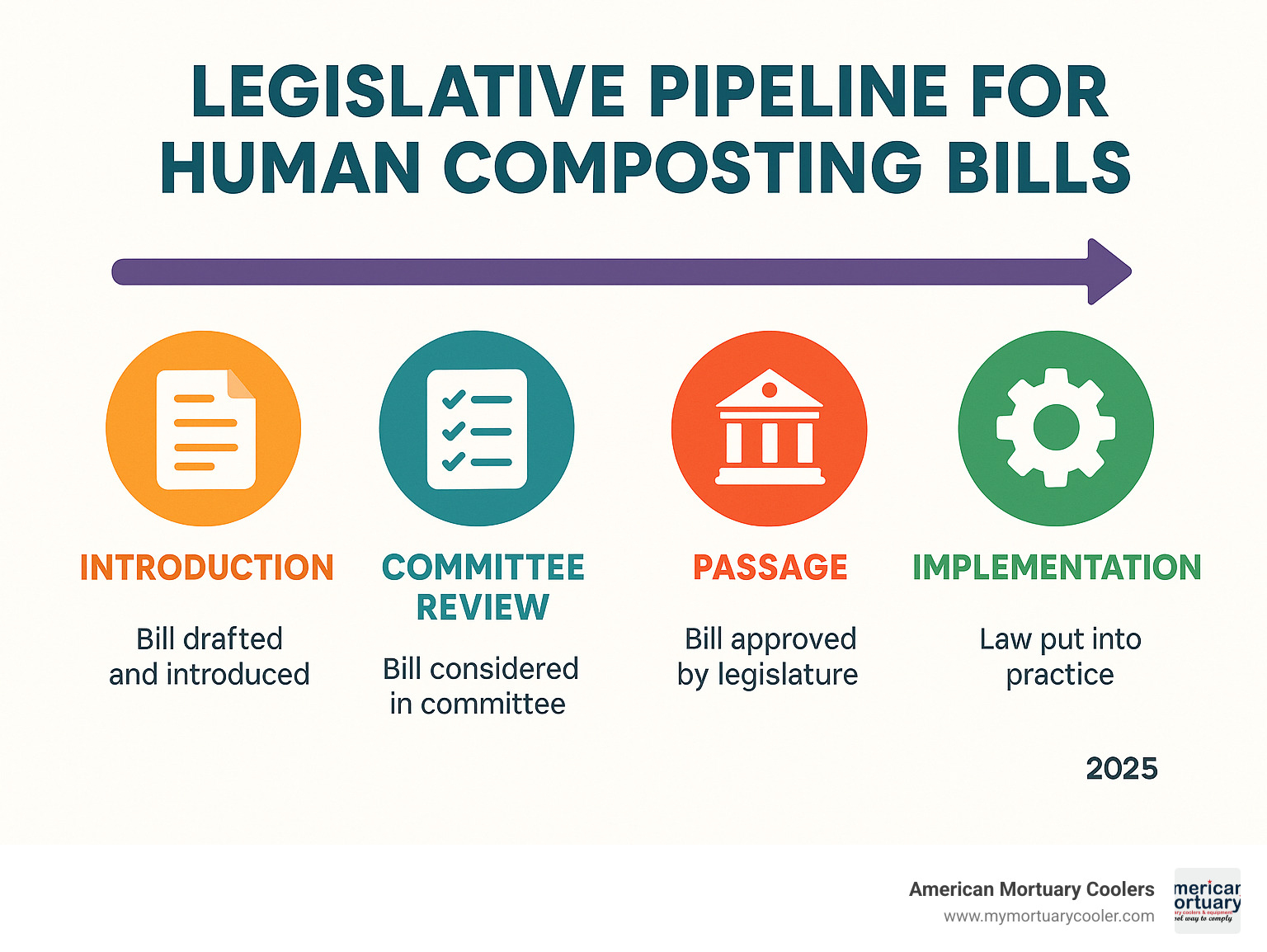
If your state isn’t on the legal list yet, keep an eye on the legislative pipeline. Bills often move from introduction to governor signature in a single session once public support coalesces.
Current front-runners include:
- Connecticut HB5354
- Illinois HB3158
- Rhode Island HB5110
Advocacy groups like Recompose and Return Home supply template emails, track votes in real time and rally local supporters. Their data shows:
- 7 states fully legalized
- 8 states with active bills
- 4 states that recently rejected bills
Even after a governor signs, expect 6 months-to-5 years before families can use the service—time needed for rule-making, inspection training and facility construction. Monitoring pending bills now gives funeral directors a crucial head start on staffing, equipment and facility design.
Step 4: Compare Human Composting to Other Eco Options
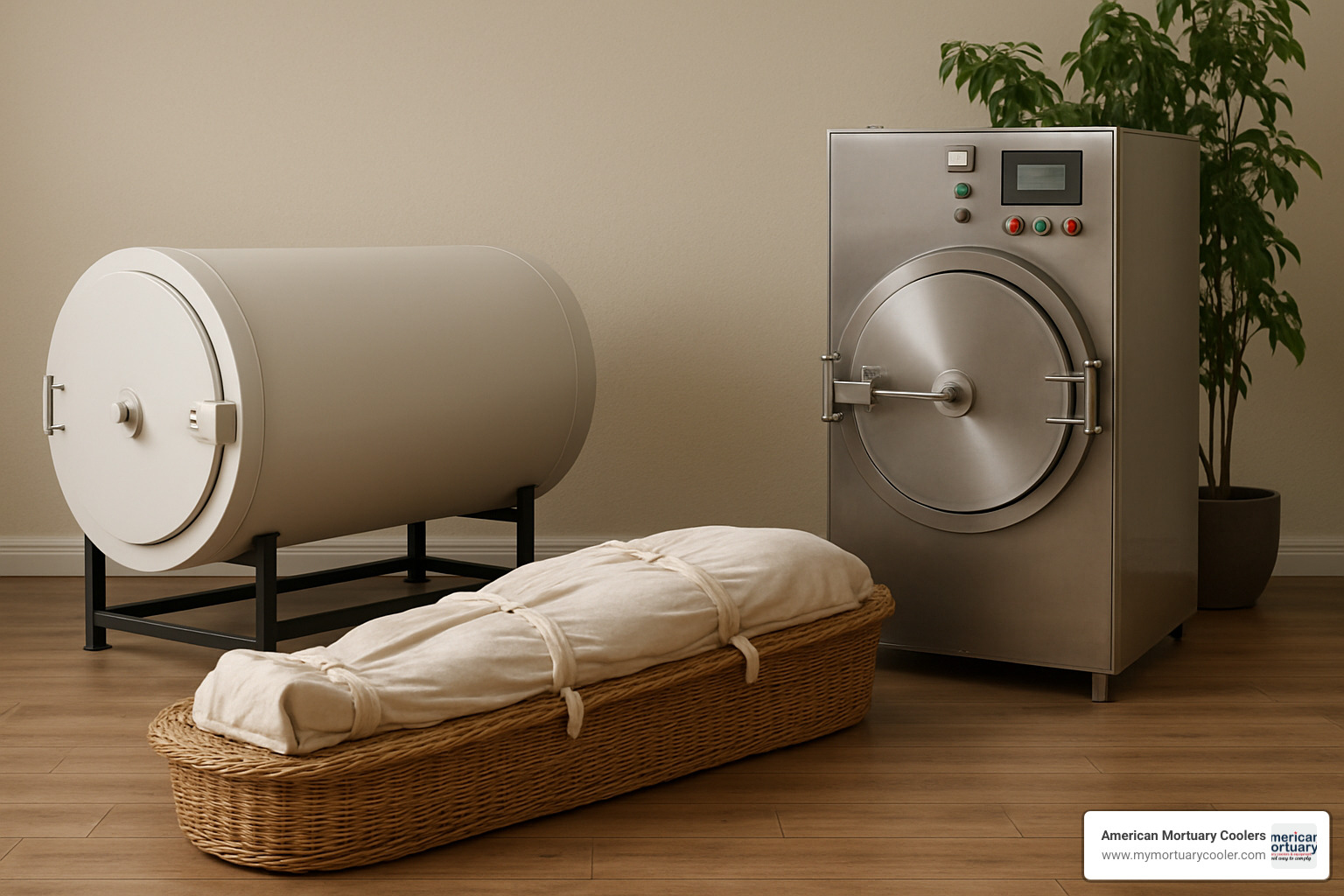
When families find where is body composting legal, they often want to understand how it stacks up against other eco-friendly funeral options. As someone who's worked with funeral directors across the country, I've seen this conversation happen countless times - and the differences might surprise you.
Human composting stands out for its minimal energy requirements. The process mainly uses electricity for aeration fans and temperature monitoring, which means it can run almost entirely on renewable energy. Compare that to traditional cremation, which burns fossil fuels at scorching temperatures of 1,800-2,000°F for hours on end.
The numbers tell an interesting story. A single cremation produces about 535 pounds of CO2 - roughly equivalent to driving your car 609 miles. Meanwhile, human composting produces virtually no direct emissions when powered by clean electricity.
Green burial remains the gold standard for environmentally conscious families in many ways. It requires no facility processing, no chemicals, and actually helps sequester carbon as trees and plants grow over burial sites. The main limitation? You need permanent cemetery space, and not every area has natural burial grounds available.
Alkaline hydrolysis (often called water cremation) offers a middle ground. It uses about one-seventh the energy of flame cremation and produces significantly fewer emissions. The process dissolves the body using heated water and alkali, leaving only bones behind - similar to cremation but much gentler on the environment.
Here's where it gets interesting for funeral directors: traditional burial actually has a surprisingly large environmental footprint. We use over 800,000 gallons of embalming fluid annually in the U.S., plus millions of tons of concrete for vaults and steel for caskets. That's a lot of manufacturing and chemical impact that families don't always consider.
Life cycle assessments show that the biggest environmental wins come from avoiding these materials entirely - the embalming chemicals, concrete vaults, and metal caskets that traditional burial requires. Whether families choose composting, green burial, or alkaline hydrolysis, they're making a significant environmental impact just by stepping away from conventional methods.
The timing varies dramatically too. Human composting takes about 45 days, while alkaline hydrolysis completes in 3-18 hours depending on temperature settings. Green burial can happen immediately, while traditional processes often involve days or weeks of preparation.
For funeral directors in states where is body composting legal, understanding these comparisons helps families make informed decisions based on their values, timeline, and budget. Each option serves different needs, and there's no single "best" choice for everyone.
Scientific research on funeral emissions
A Comprehensive Guide to Body Composting Laws in Oregon
Step 5: Weigh Environmental & Health Considerations
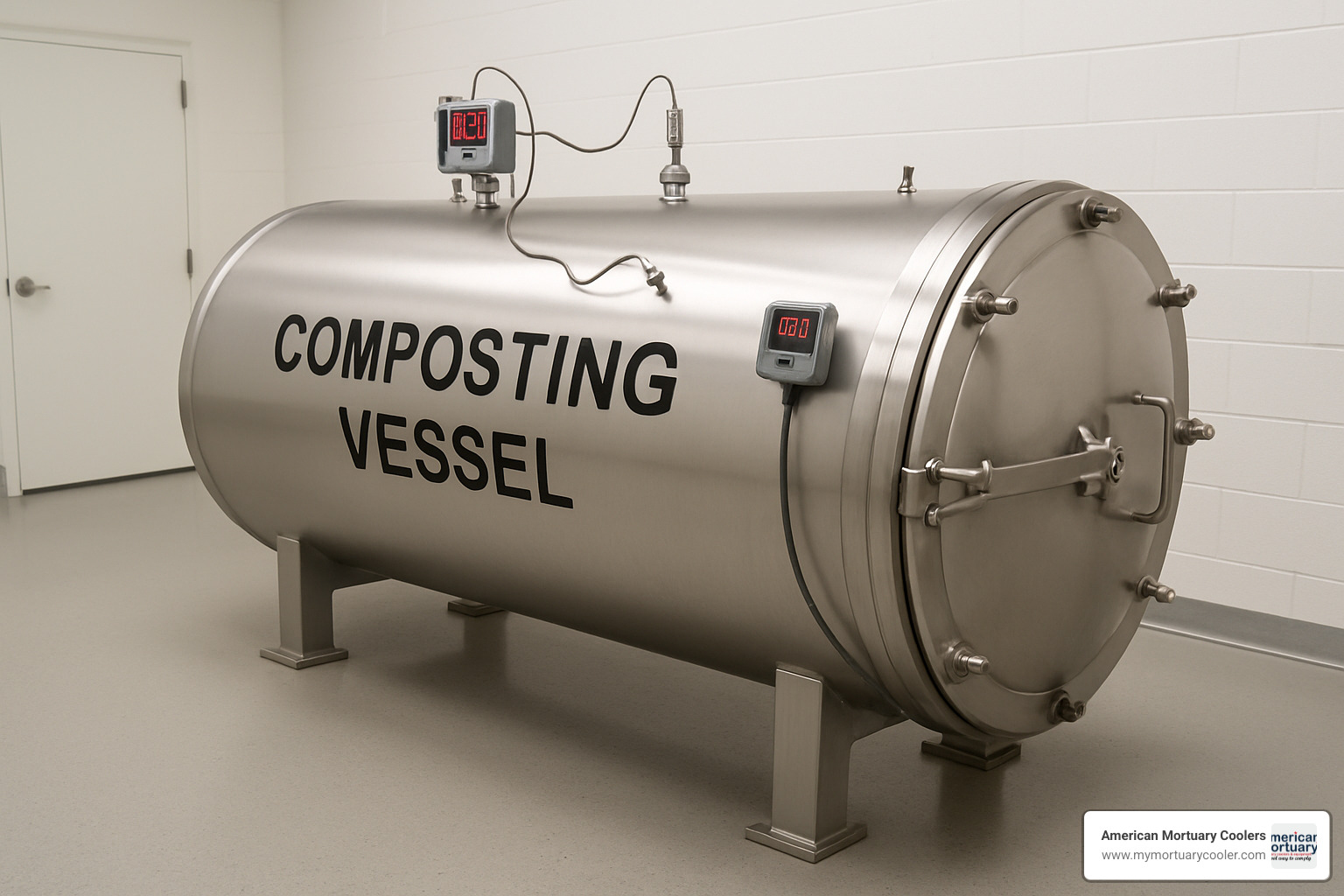
When researching where is body composting legal, it's important to understand the environmental and health safeguards built into the legislation. These considerations often drive the regulatory requirements in each state.
Temperature and Safety Requirements: All legal states require composting vessels to maintain 55°C for 72 hours minimum to ensure pathogen inactivation. This isn't just a suggestion - it's a legal requirement with serious oversight. Internal probes monitor temperature continuously, and facilities must maintain detailed records.
Health Risk Exclusions: States have specific exclusions to protect public health:
- Bodies with certain infectious diseases (prion diseases like Creutzfeldt-Jakob disease)
- Recent chemotherapy or radiation therapy patients
- Bodies with certain medical implants that can't be removed
- Cases involving radiological contamination
Soil Use Restrictions: Colorado's SB21-006 specifically prohibits using composted soil for growing edible crops. This is common across legal states. The soil can be used for:
- Memorial gardens and landscaping
- Land restoration projects
- Conservation areas
- Personal memorial plantings (non-food)
Environmental Monitoring: Legal states require:
- Odour controls - Proper ventilation and biofilter systems
- Wastewater management - Any liquid discharge must meet pH requirements
- Air quality monitoring - Emissions controls for bioaerosols
- Soil testing - Final compost must be tested for pathogens and heavy metals
Scientific Validation: Research from Oregon universities found that composted human remains had heavy metals well under EPA limits and showed 95% breakdown of pharmaceuticals. This data supports the safety profile that convinced legislators to approve the process.
The Canadian National Collaborating Centre for Environmental Health notes that while there are potential environmental health concerns, proper process conditions (temperature, time, pH) and trained operators can minimize risks effectively.
Step 6: Access Services If Your State Isn't on the List
Living in a state that hasn't legalized human composting doesn't mean you're out of options. Many families successfully arrange where is body composting legal services by working with facilities in neighboring states that welcome out-of-state clients.
The reality is simpler than you might expect. Licensed funeral homes handle cross-border transport regularly - it's a standard part of their services. Whether someone passes away while traveling or families want to access specific services elsewhere, funeral directors coordinate these arrangements every day.
Your local funeral home becomes your advocate in this process. They'll handle the death certificates, transport permits, and coordination with the receiving facility. Most funeral directors are familiar with interstate transport requirements, even if they haven't specifically arranged human composting services before.
Transportation happens two ways: ground transport for nearby states or airline mortuary shipment for longer distances. Ground transport works well if you're within driving distance of states like Washington, Colorado, or Oregon. For families further away, air transport opens up all the legal states as options.
Return Home in Seattle has pioneered international services, accepting bodies from Canada and handling all the complex logistics. They coordinate air and ground transport from Canadian provinces, manage Canadian Food Inspection Agency compliance for soil return, and provide support throughout the entire process. If they can handle international borders, domestic state-to-state transport is straightforward.
The financial reality includes transport costs on top of the typical $7,000 human composting fee. Ground transport might add $1,000-$2,000, while air transport can add $2,000-$3,000 depending on distance. Many families find these costs reasonable compared to traditional funeral expenses, especially when the service aligns with their values.
Planning ahead makes everything smoother. If human composting interests you but your state hasn't legalized it yet, start conversations with local funeral homes about transport options. Some funeral directors have already established relationships with composting facilities in legal states. Pre-planning also helps lock in current pricing and ensures your wishes are clearly documented.
Body Composting Colorado 101: Legal Options Explained
Step 7: Plan Ahead & Choose Trusted Providers
Understanding where is body composting legal is just the first step - choosing the right provider can make all the difference between a meaningful experience and a stressful one. After working with facilities across all 12 legal states, I've seen what separates exceptional providers from the rest.
The most important thing to verify is proper licensing. Every legitimate human composting facility must have a state funeral regulator license, facility health department permits, environmental compliance certificates, and certified operator training. Don't be shy about asking to see these credentials - reputable providers are proud to share them.
Temperature monitoring is absolutely critical for both safety and legal compliance. Look for facilities with continuous digital monitoring systems that include alarms. The best providers will show you their monitoring equipment and explain how they maintain the required 55°C for 72 hours. If a facility can't or won't explain their temperature controls, that's a red flag.
Cost varies significantly between providers, even within the same state. Human composting averages around $7,000, which is competitive with traditional burial at $8,300 median and slightly higher than cremation at $6,280. Green burial remains the most affordable option at $1,000-$2,000, but human composting offers unique benefits that many families find worth the investment.
Pre-planning has become increasingly popular, especially as facilities fill up in newly legal states. When you pre-plan, you lock in current pricing, ensure your wishes are properly documented, and remove difficult decisions from your family during an already emotional time. Most importantly, you guarantee availability at your preferred facility.
The best providers welcome questions and facility tours. Ask about their safety record, what happens to soil if families don't want it, whether they offer memorial services, and their policies for excluded cases. Certified operators who can clearly explain their processes indicate a facility that takes quality seriously.
At American Mortuary Coolers, we've supplied storage and handling equipment to facilities across all legal states. The providers who invest in quality infrastructure - including proper mortuary coolers, handling equipment, and monitoring systems - consistently deliver the most reliable service to families.
More info about human composting equipment
Frequently Asked Questions about Where Is Body Composting Legal
When families start researching where is body composting legal, they often have practical questions about the process itself. After working with funeral homes across all 12 legal states, I've heard these three questions more than any others.
Which infectious diseases exclude a body from composting?
The most important exclusion involves prion diseases like Creutzfeldt-Jakob disease. These proteins can survive even the high temperatures used in composting, so every legal state prohibits composting bodies with confirmed or suspected prion diseases.
Beyond prions, most states also exclude recent chemotherapy patients (typically within 30 days of treatment), people who've had radiation therapy, and cases involving radiological contamination. Some states have additional restrictions for certain infectious diseases, though the high-temperature composting process actually eliminates most pathogens.
Each facility maintains its own detailed exclusion list based on state regulations and safety protocols. When families call to inquire about services, reputable providers will ask specific health history questions to ensure the body qualifies for composting. It's always better to ask upfront rather than find exclusions later in the process.
Can composted soil be used in vegetable gardens?
This is probably the most misunderstood aspect of human composting. No, you cannot use the composted soil for growing food crops. Colorado's SB21-006 specifically prohibits this use, and other states have similar restrictions written into their laws.
The soil is perfectly safe for memorial gardens, landscaping projects, land restoration work, and conservation areas. Many families create beautiful memorial spaces using the soil, planting flowers, trees, or native plants that don't produce food.
This restriction exists more for public comfort than safety concerns. The composting process and final testing ensure the soil is pathogen-free and meets environmental standards. But lawmakers wanted to address any public health concerns by keeping human-composted soil separate from food production.
How long does the entire process take?
The active composting phase takes about 45 days, but that's just one part of the timeline. From the moment a body arrives at the facility until families receive the soil, expect 8 to 12 weeks total.
Here's what happens during that time: initial preparation and placement in the composting vessel, the 45-day composting period with continuous temperature monitoring, a curing phase where the compost stabilizes, screening to remove any non-organic materials like surgical pins, final testing for pathogens and quality, and packaging for return to families.
Some facilities are faster than others, and timing can vary based on seasonal demand. During busy periods, there might be a waiting list that adds to the overall timeline. When families are planning services, we always recommend asking the specific facility for their current processing timeframes so you can set realistic expectations.
Conclusion
The question where is body composting legal has taken us through an evolving landscape that's reshaping how Americans think about end-of-life care. As we've seen, the answer isn't just about the 12 states that have passed legislation—it's about understanding the gap between legal frameworks and operational reality.
What strikes me most about this industry is how quickly it's grown from Washington's pioneering 2019 law to today's expanding network of facilities. Yet the journey from legalization to actual service availability can take years. California families won't see services until 2027, while states like Minnesota and Maine are just beginning to develop their regulatory frameworks.
For families asking where is body composting legal, the practical answer often involves looking beyond state lines. The success of cross-border services—like Return Home's work with Canadian families—shows that geography doesn't have to limit access to this sustainable option.
The numbers tell a compelling story. With 68% of Americans expressing interest in green funeral options, we're witnessing a fundamental shift in consumer preferences. This isn't just a trend—it's a movement toward more environmentally conscious choices that align with personal values.
At American Mortuary Coolers, we've had the privilege of supporting this transition by providing specialized equipment to facilities across the country. From our locations spanning Tennessee to California, we've seen how proper infrastructure makes the difference between a facility that merely meets regulations and one that truly serves families with dignity and care.
The funeral industry is at an inflection point. Understanding where is body composting legal today helps us prepare for tomorrow's opportunities. Whether you're a funeral director considering new services or a family planning ahead, staying informed about this rapidly changing landscape is essential.
As more states introduce legislation and existing facilities expand their capacity, the question will shift from "where is it legal?" to "which provider offers the best care for my family?" That's a future worth preparing for.
















